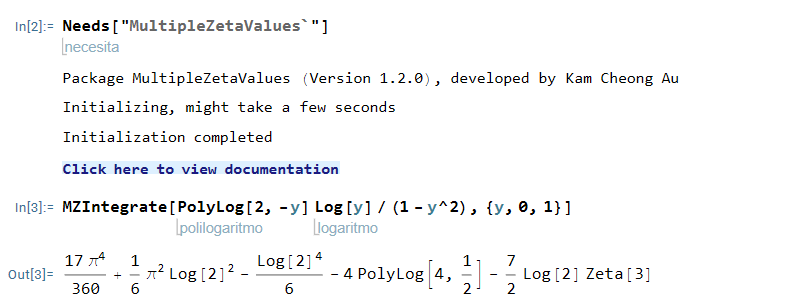Use Package MultipleZetaValues (Version 1.2.0) for Mathematica, developed by Kam Cheong Au,
You can get it and install using this command
PacletInstall[CloudObject["https://www.wolframcloud.com/obj/pisco125/MultipleZetaValues-1.2.0.paclet"]]
It gives this closed form straightwise
I guess this result is proven (it is not conjectured) as you can check it following Au publications in the arXiv [1], [2], [3] and [4].
From the comments, the OP is searching a developed ("chisel and hammer") answer. I will bring such answer for both, A.- the integral question and B.- the trigamma series that originated it.
We use the following references
[5] Ming Hao Zhao "On logarithmic integrals, harmonic sums and variations" arXiv:1911.12155v13 [math.CA]
This provides a wide compendium of methods and techniques to solve Euler Sums, polylog integrals and much more from undergraduate to deep research specialized level.
[6] Valean, C.I.: (Almost) Impossible Integrals, Sums, and Series, Springer, Cham, First Edition (2019).
[7] Valean, C.I.: More (Almost) Impossible Integrals, Sums, and Series, Springer, Cham, First Edition (2023)
A.- The polylog integral $$I=\int_0^1\frac{\log(y)\,Li_2(-y)}{1-y^2}\,dy$$ We use these generating functions, [7] pg. 398 and 406, valid for $|x|<1$, $k\ge 1$ and $k\in \mathbb{N}$ $$g_k(x)=\frac{Li_k(x)}{1-x}=\sum_{n=1}^\infty x^n H_n^{(k)}\quad\textrm{and}\quad \bar{g}_k(x)=\frac{Li_k(-x)}{1-x}=-\sum_{n=1}^\infty x^n \bar{H}_n^{(k)}$$ where $H_n^{(k)}=\sum_{m=1}^n m^{-k}$ and $\bar{H}_n^{(k)}=\sum_{m=1}^n\ (-1)^{m-1} m^{-k}$ with $H_0^{(k)}=\bar{H}_0^{(k)}=0$. So, $$I=\frac{1}{2}\int_0^1\left[g_2(-x)+\bar{g}_2(x)\right]\cdot\log(x)\,dx $$ but $\int_0^1 x^n \log(x)\,dx = -1/(n+1)^2$, $n\in\mathbb{N}\cup\{0\}$. Therefore, by dominated convergence to commute sums and integral, we have $$I=\frac{1}{2}\sum_{n=1}^\infty (-1)^{n-1}\frac{H_n^{(2)}}{(n+1)^2}+\frac{1}{2}\sum_{n=1}^\infty\frac{\bar{H}_n^{(2)}}{(n+1)^2}$$ $$I=\frac{1}{2}\sum_{n=1}^\infty (-1)^{n-1}\frac{H_{n+1}^{(2)}-\frac{1}{(n+1)^2}}{(n+1)^2}+\frac{1}{2}\sum_{n=1}^\infty\frac{\bar{H}_{n+1}^{(2)}-(-1)^n\frac{1}{(n+1)^2}}{(n+1)^2}$$ $$I=\frac{1}{2}\sum_{n=1}^\infty (-1)^{n}\frac{H_n^{(2)}}{n^2}+\frac{1}{2}\sum_{n=1}^\infty\frac{\bar{H}_n^{(2)}}{n^2}$$. Now apply summation by parts on the second sum with $a_n=1/n^2$ and $b_n=\bar{H}_n^{(2)}$, this gives $$\sum_{n=1}^\infty\frac{\bar{H}_n^{(2)}}{n^2}=\frac{17}{720}\pi^4+\sum_{n=1}^\infty (-1)^{n}\frac{H_n^{(2)}}{n^2}$$ Therefore $$I=\frac{17}{1440}\pi^4+\sum_{n=1}^\infty (-1)^{n}\frac{H_n^{(2)}}{n^2}$$ The right hand sum is a classical result for an alternating harmonic sum. For instance [6] pp. 309-310, also [5] pg. 88 Table 9.2 Euler Sums 7th row under Weight 4 ES (2;-2). It gives $$\sum_{n=1}^\infty (-1)^{n}\frac{H_n^{(2)}}{n^2}=\frac{17}{480}\pi^4+\frac{1}{6}\pi^2\log^2(2)-\frac{1}{6}\log^4(2)-\frac{7}{2}\zeta(3)\log(2)-4Li_4\left(\frac{1}{2}\right)$$ Finally $$I=\frac{17}{360}\pi^4+\frac{1}{6}\pi^2\log^2(2)-\frac{1}{6}\log^4(2)-\frac{7}{2}\zeta(3)\log(2)-4Li_4\left(\frac{1}{2}\right)$$
B.- The polygamma series $$S=\sum_{n=1}^\infty(-1)^{n-1}\psi_1^2(n)$$ where the trigamma function (we use a subscript index) is $\,\psi_1(z)=\sum_{k=0}^\infty\,1/(k+z)^2$ satisfies this recurrence $\psi_1(2n-1)=\psi_1(2n)+1/(2n-1)^2$ which will be used together with $\,\psi_1(n+1)=\zeta(2)-H_n^{(2)}$. Writing $S$ as $$S=\sum_{n=1}^\infty\psi_1^2(2n-1)-\psi_1^2(2n)=\sum_{n=1}^\infty\left[2\frac{\psi_1(2n)}{(2n-1)^2}+\frac{1}{(2n-1)^4}\right]$$ $$S=2\sum_{n=1}^\infty\frac{\psi_1(2n)}{(2n-1)^2}+\frac{\pi^4}{96}=2\sum_{n=1}^\infty\frac{\zeta(2)-H_{2n-1}^{(2)}}{(2n-1)^2}+\frac{\pi^4}{96}$$ $$S=\frac{5}{96}\pi^4-2\sum_{n=1}^\infty\frac{H_{2n-1}^{(2)}}{(2n-1)^2}=\frac{5}{96}\pi^4-\sum_{n=1}^\infty\frac{\left[(-1)^{n-1}+1\right]H_n^{(2)}}{n^2}$$ The alternating sum we already have it already above. The monotone sum is also a classical result for a weight 4 Euler Sum. See 5 pg. 88 Table 9.2 Euler Sums 5th row under Weight 4 ES (2;2). It gives $$\,\sum_{n=1}^\infty\frac{H_n^{(2)}}{n^2}=\frac{7}{360}\pi^4$$ Joining all pieces, $$S=\frac{49}{720}\pi^4+\frac{1}{6}\pi^2\log^2(2)-\frac{1}{6}\log^4(2)-\frac{7}{2}\zeta(3)\log(2)-4Li_4\left(\frac{1}{2}\right)$$

